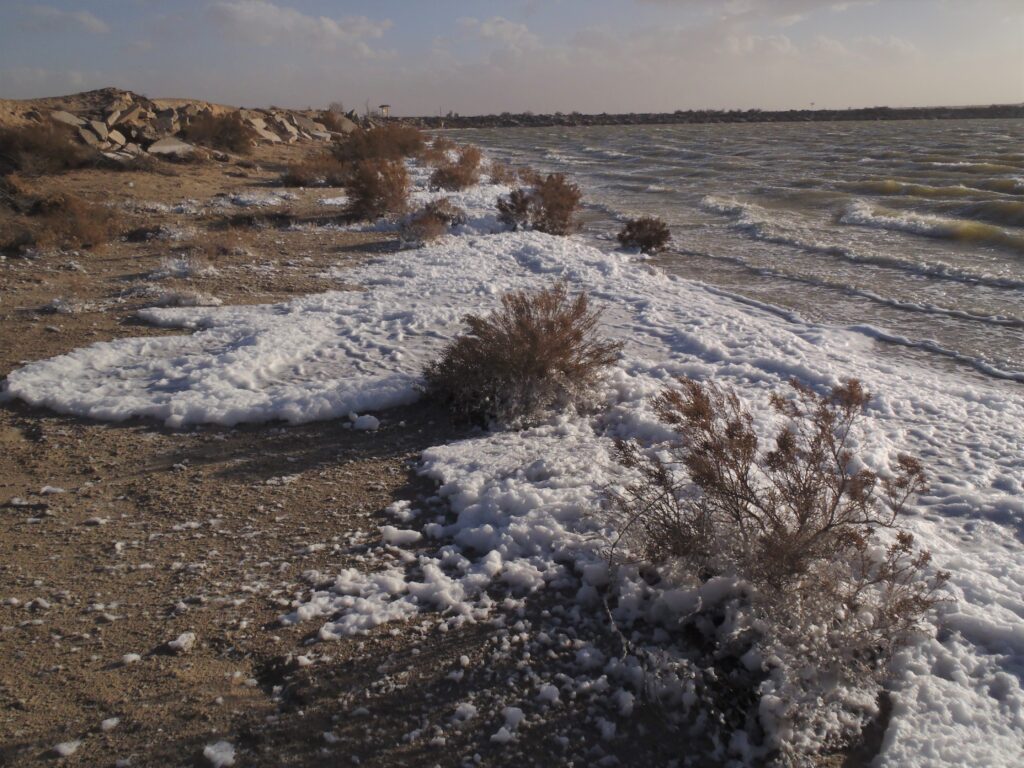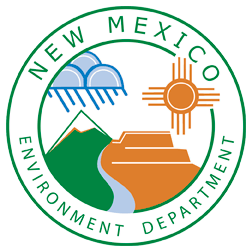What are PFAS?
PFAS which is short for Per- and Poly- Fluoroalkyl Substances are man-made chemicals that do not break down in the environment

These are often called “forever chemicals” because once they enter our bodies, they stay there forever.
PFAS exposure has been linked in human studies to increased risks of kidney and testicular cancers, changes in liver function, thyroid disease, elevated cholesterol, pregnancy complications (including gestational hypertension and preeclampsia), lower birth weight, and impacts on the immune system such as reduced vaccine antibody response.
Because many PFAS persist and can build up in the body, even small, repeated exposures over time can matter.
What is New Mexico doing about PFAS contamination?
New Mexico is host to some of the nation and world’s most extensive PFAS contamination, especially near military bases where PFAS-laden firefighting foams were used for decades, including at Cannon Air Force Base in Curry County and Holloman Air Force Base in Otero County.
Due to this, the state in recent years has been on the leading of tackling the effects of PFAS contamination, with actions such as:
- Passing the PFAS Protection Act, which prohibits intentionally added PFAS in many consumer products.
- Adding PFAS firefighting foams to the New Mexico’s Hazardous Waste Act, giving the state clear authority to regulate the management and cleanup Aqueous Firefighting Foams (AFFF) by polluters and shifting the financial burden from taxpayers to the responsible party.
- Suing the U.S. Department of War to compel the military to halt non-emergency use of PFAS foam and compensate property owners harmed by pollution caused by it.
- Launching NMED’s PFAS Blood Testing Program — offering free PFAS blood testing to adults who lived or worked near Cannon Air Force Base.
How do I participate in PFAS Protection Act (HB212) rulemaking?
The PFAS Protection Act, passed in the 2025 Legislative Session, phases out consumer products with intentionally-added PFAS, making sure forever chemicals don’t find their way into New Mexicans’ homes.
Starting January 1, 2027, products such as cookware, food packaging, dental floss, juvenile products, and firefighting foam are banned. On January 1, 2028, it expands to include carpets, cleaning items, cosmetics, fabrics, feminine hygiene products, textiles, ski wax, upholstered furniture, By January 1, 2032, virtually all non‑exempt products containing intentionally added PFAS are prohibited unless deemed a “currently unavoidable use” by the Environmental Improvement Board.
Manufacturers must also begin reporting detailed information about PFAS content in their products by 2027. The legislation includes important exemptions and enforcement provisions — such medical devices and electronic — where PFAS is essential and does not pose serious harm to those using the products.
Rulemaking Process and Engagement Opportunities
Under the PFAS Protection Act, the New Mexico Environment Department is required to pass rules through the Environmental Improvement Board, or EIB, to govern the processes, requirements, and enforcement of the new law.
NMED filed its proposed rules to the EIB on Oct. 8. They can be viewed here. In addition, NMED has opened a public comment portal for those wishing to provide feedback on the proposed rules.
As part of the rulemaking process, NMED has and held a series of public engagements to allow New Mexicans to ask learn and ask questions about the PFAS Protection Act:
- Stakeholder Webinar —Thursday, September 25, 2025
- Public Informational Webinar — Wednesday, October 22, 2025
Fact Sheets
- Fact Sheet: Protecting New Mexicans From PFAS in Consumer Products
- Fact Sheet: New Mexico’s PFAS Protection Act Regulation
How do I protect myself from PFAS in New Mexico?
If you do not live near a known contaminated site
Choose PFAS-free products. PFAS are used in many consumer products like cookware, clothing and food packaging. Limiting exposure at home can reduce your risk.
PFAS Central and the Ecology Center provide free guides for PFAS-free purchasing, with many brands sold in New Mexico:
Check your water. If you are on a private well, consider periodic water testing.
List of certified private well water testing labs
If you do live near a contaminated site
- Still choose PFAS-free products.
- Test your water. If you are on a private well, get your water tested at a certified lab. If you are on public water, check system reports for PFAS results.
List of certified private well water testing labs - Install a home filtration system. Such systems can reduce PFAS exposure. The Environmental Protection Agency has more information on how to select the right one for your home.
EPA Home Filtration Fact Sheet - Have your blood tested for PFAS levels and talk to your healthcare provide. While NMED previously offered free testing near Cannon Air Force Base, the program has been paused for now. However, ask your physician about being tested for PFAS.
The New Mexico Department of Health also has guidance on how to talk to your healthcare provider on how to manage your PFAS exposure and its potential health effects:
Department of Health fact sheet on how to manage your PFAS exposure

